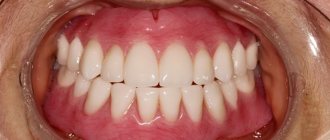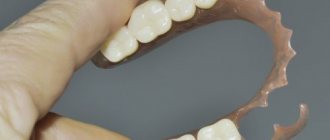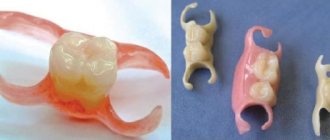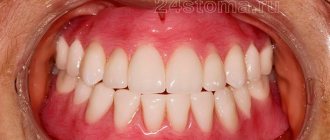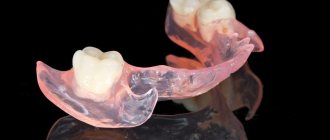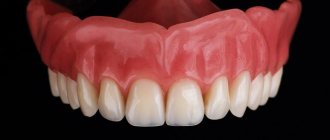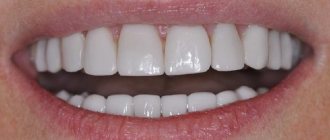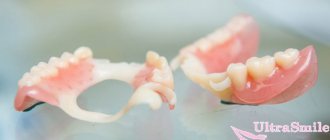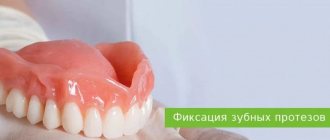How long can you wear without taking it off?
How to store? How to care? Whitening dentures Service life Dentures for many years You can restore the dentition in different ways, including removable dentures. They help restore the beauty of a smile, restore chewing function, and increase self-esteem. In order for restorations to retain their attractive appearance and last for several years, they must be looked after. Cleaning dentures and disinfecting them is an important part of care.
After installation, the dentist will definitely give recommendations on how to use dentures. He will warn that in the first days the restoration will interfere. It is necessary to prepare yourself psychologically and survive this time. It will become easier in a few days. Usually the hardest day is the first. Then a difficult 5-7 days
addictive, but they are not so intense. During this period, orthopedists advise not to remove the denture at night and generally remove it from the mouth only for cleaning.
These days, the patient practices his skills of taking off and putting on dentures, speaking when the tongue is cramped in the mouth, and chewing with unusually high teeth.
How long can you wear a prosthesis without removing it?
It is believed that the adaptation period has come to an end when the patient without dentures becomes uncomfortable. He already knows how to quickly put them on, they do not interfere with speaking, and are involved in chewing food. The period when it is better not to remove the structure is ending. Now you can take it out, but how often?
The standard recommendation is to remove the dentures at night to give your gums a chance to rest. If the denture is not removed, the hygienic condition of the oral cavity deteriorates. However, modern dentistry is characterized by an individual approach, so how often to remove dentures depends on specific circumstances. For example, with removable prosthetics, it is important how many antagonist teeth remain. In some cases, a prosthesis helps protect the remaining teeth from traumatic occlusion (touch) and overstrain. Do not remove splinted structures or restorations due to arthropathy and bruxism
[1].
The side effects of restoration can be compensated for by using prosthetic products without a palate and frequent cleaning.
Basic rule:
The less often the patient removes the prosthesis, the more carefully it needs to be looked after.
Possible problems and methods for solving them
Regardless of how removable dentures are attached and what material they are made of, the vast majority of patients face some problems characteristic of the adaptation period. Let's list the most common ones among them.
Excessive salivation
The increased production of saliva is explained by the fact that the body perceives any object that ends up in the oral cavity as food, and therefore begins to produce saliva to process it. The problem is relevant only in the first days, then everything returns to normal, but even in a short time it can become a source of trouble.
The way out of the situation is salt rinsing, which helps reduce the amount of saliva in the mouth. They will require a solution of 100 milliliters of water and half a teaspoon of salt. The effect of this rinse lasts for an hour, after which the procedure is repeated.
In the first days of wearing a prosthesis, your gums may hurt - this is a normal reaction to the prosthesis.
Pain in gums while wearing
Pain can appear both due to poor-quality manufacturing of the prosthesis, and as a natural reaction of the body to the appearance of a foreign body. In the second case, you can deal with it yourself. The following will help reduce pain:
- Rinse with soothing herbal infusions.
- Using medicinal oils of sea buckthorn or rosehip in the form of applications.
- Refusal of hard foods.
- Self-massage of gums.
If the pain does not go away, ulcers and chafing occur - probably the reason is poor manufacturing and improper placement of the structure. In this case, only a doctor can correct the situation by relining and adjusting the prosthesis.
If discomfort persists, consult a doctor as the denture may need to be relined.
Feeling of dry mouth
Dry mouth is a normal physiological reaction of the body to dentures. After complete adaptation, it will disappear; to speed up the process, it is recommended to drink more and always carry a bottle of water with you.
If the situation does not change within 1-2 weeks, especially if itching and burning are added, you should consult a doctor, since these symptoms may indicate the development of candidiasis.
Rubbing gums
At first, rubbing occurs frequently: over the course of 1-2 months, a prosthetic bed is formed, and the mucous membrane adapts to the foreign structure. The more precisely the product is made, the better it fits to the gums, the lower the likelihood of chafing. If they do occur, the following measures will help:
- The use of medicinal ointments (oxolinic, nystatin, acyclovir and others) and gels (Cholisal, Kamistad, Asepta).
- Correction of the shape of the prosthesis if it does not correspond to the soft tissues. Excess areas of the structure are determined by the imprints left on the gums and are removed with a milling cutter, after which final grinding is carried out.
- Replacement of a product indicated when it is deformed, shrinks, or an allergic reaction occurs.
To reduce discomfort during the period of getting used to the prosthesis, use special gels and ointments
The prosthesis causes vomiting
The gag reflex is caused by the sensitivity of the soft palate, which is a protective reaction of the body. During prosthetics, the tighter the product adheres to the mucosa, the less it appears. If the fit is incomplete, the patient may feel nauseated, so the main task is the most accurate work of the orthopedist and dental technician.
To get rid of nausea, it is recommended to drink hot tea with lemon and suck on mint candies. Another way is to distract yourself from your own feelings by doing something that requires concentration. If nausea does not go away, it makes sense to undergo an examination, since an increased gag reflex can be a manifestation of some chronic diseases (for example, helminthic infestation).
Impaired diction
Sound production is impaired, since the free space in the oral cavity becomes less with the advent of the prosthesis. At the top it covers part of the palate, and at the bottom it covers the sublingual space. Speech restoration occurs much faster if the design provides for the absence of an artificial palate.
To restore diction, it is necessary to perform special speech therapy exercises, which will be taught by an orthopedist. Other ways are regular reading aloud (for 15-20 minutes), saying tongue twisters.
To restore diction during the adjustment period, perform special exercises
Chewing problems
The ability to chew food normally is not restored immediately, but it will return faster if you put in some effort:
- Chew on both sides. This way the load will be distributed evenly and the structure will not move.
- You should not bite food with your front teeth: the risk of the structure shifting increases.
- At first, it is necessary to give preference to soft foods, eating them in small portions and chewing them slowly.
- Doctors recommend using special means for fixation to prevent food particles from getting under the artificial base.
- There is no need to eat hard foods or those containing small particles (for example, berries with small seeds).
Changing tastes
The decrease in the sensitivity of taste buds is explained by the fact that they are covered by a plastic or nylon base. Lack of taste in food leads to decreased appetite, deterioration of mood, and this can lead to problems in the functioning of the gastrointestinal tract.
Dentures that cover the roof of your mouth can affect your taste buds and dull your sense of taste.
In order for the sensations to return, it is necessary to spend more time chewing each piece of food, giving preference to a soft consistency. Over time, receptors adapt to new conditions.
Foods to avoid
Proper care of dentures also means that you need to treat them with care. During the first time after installation, patients have to slightly change their diet. Although most foods will gradually return to your diet, some of them should be abandoned altogether. These are solid products: crackers, nuts, seeds, dried bread and bagels. Classified as unwanted
include toffee, nougat, and chewing gum. It is better to avoid food that is too hot to prevent cracks in the base.
At first, it is better not to bite off anything at all, then bite off with the side group of teeth, gradually moving to the front group.
It is important to chew food slowly, making sure that the chewing load is distributed evenly on both sides.
Tea, coffee, red wine and dark berries create conditions for discoloration of restorations. This should also be kept in mind when choosing drinks and food.
This is especially true for acrylic plastics. They are permeated with micropores in which pigments easily accumulate. More modern materials such as Acry Free or QuattroTi are dye resistant.
How to store
The best place to store dentures is in a special container. As a last resort, you can put it in a glass of water or wrap it in a damp cloth. To store dentures at night and between uses:
- away from children and animals;
- in a special solution or cooled boiled water. Do not immerse in boiling water or tap water, which contains many impurities.
Whether to place the product in water or a special storage solution largely depends on the material
. Modern thermoalloys do not need a humid environment, but classic acrylic ones can dry out without water. Your dentist will advise you on how to properly store dentures, taking into account the material of construction.
Accustoming stage
As with any external implantation, you definitely need to get used to installing prostheses. At the initial stage, you will definitely feel severe discomfort. It is possible that unwanted problems with diction will arise and taste sensations will change. Against this background, it is important for the patient to show psychological resilience.
Strong vomiting and excessive salivation are considered completely undesirable phenomena.
Oddly enough, a person gets used to permanent dentures faster than removable ones. The entire adaptation period depends on the following factors:
- Product size.
- Fixation method.
- Degree of fixation.
- The body's reaction to the introduction of a foreign body.
- On the nature of the impact.
There are times when the denture rubs the gums. In this situation, you definitely need to visit the dentist, otherwise a strong inflammatory process will begin.
To make the addiction process easier, you need to adhere to the following rules:
- Keep your teeth and dentures clean.
- Clean installed structures using dental floss.
- Massage your gums regularly.
- In case of gum rubbing, use a fixing cream, for example, Corega.
How to care for dentures
A side effect of removable dentures is a change in the microflora of the oral cavity. Because of the prosthesis, the palate and gums stop cleaning themselves. Bacteria accumulate in the mouth, especially at the points of attachment to the crown of the tooth, if the structure is partial. The longer a restoration is used, the more it is exposed to biocontamination.
Proper care has a great impact on the service life of removable structures. It is multi-stage, but in reality it does not require much time and effort.
In dentistry, there are mechanical, chemical, and physical methods of cleaning restorations.
Mechanical cleaning
carried out with a special toothbrush. The fact that it has bristles on both sides helps to effectively clean removable dentures from plaque. The longer one is for processing the outside, and the short one is for the inside. The heads are either straight or crescent-shaped.
An orthopedic dentist will definitely tell you how to clean your dentures. The brush should be soft, usually written “soft” on the packaging, and the paste should be low-forming. The abrasiveness coefficient is indicated on the packaging under the letter RDA
.
For nylon and Acry Free bases, it is best to choose a paste with zero abrasiveness
. These are produced for children under 3 years of age. Instead of toothpaste, you can use liquid soap.
Acrylic bases can be cleaned with a paste with an abrasiveness of up to 25
. For ordinary pastes, this coefficient is 60 or higher. Whitening pastes are not recommended.
Chemical cleaning
- This is soaking in disinfectant solutions. The structure is immersed in the prepared solution or a special tablet is added to the water. Such products are sold in pharmacies. The most famous brands: Corega and Protefix. These products destroy bacterial plaque, which can cause diseases of the mucous membrane and cause an unpleasant odor from the prosthesis. After being in the solution, the structure emits a pleasant aroma.
However, in case of heavy contamination, such disinfection does not provide 100% cleaning. If a layer of pigment or tartar has formed on the product, home care tablets for removable plastic dentures will not help. Here they use polishing at the dentist or ultrasound.
Physical cleaning
Ultrasound is suitable for complete dentures made of any material. Ultrasound passes through the liquid, creating bubbles on the surface of the restoration, which, when bursting, help clear plaque on the dentures, clean them of food debris and dirt, even from hard-to-reach places. 10-20 minutes in such a bath and not a trace remains of bacterial plaque. The higher the power of the ultrasonic bath, the better it cleans the surface.
After each meal, it is recommended to rinse the restoration under running water. The cleaner the denture, the more comfortable it feels in the mouth. A structure covered with plaque and stains wears out faster. In addition, dirt and bacterial film provoke inflammatory processes in the oral cavity. With proper and regular use of cleaning products, restorations retain their attractive appearance for a long time.
If the structure has become dull and shows signs of pigmentation, you can contact your dentist and he will send the denture for polishing.
Features of wearing removable dentures
Removable dentures have some features. When designing removable dentures, it is impossible to take into account several factors that can only appear while wearing the dentures. This is the degree of pressure of the prosthesis on the gum and the degree of fixation of the prosthesis. It happens that at first patients are concerned about pain when wearing dentures.
Correction of removable dentures
Correction of removable dentures - grinding of the structure in places of contact with the oral mucosa - is carried out the next day after installation of the denture. During the first two weeks of wearing the structure, several adjustments to the prosthesis may be required.
The correction procedure is carried out in the dental office by the attending dentist. Before visiting a doctor to have your denture adjusted, be sure to wear it and walk around with it for at least three to four hours. Also, do not carry out self-correction of a removable denture using improvised tools. At best, this will completely disrupt the fixation of the prosthesis, and at worst, it will lead to a breakdown, after which it is impossible to restore the structure - you will have to make a new one.
If the denture rubs the gum
Some patients, when wearing dentures for the first time, complain that the structure rubs their gums. This is the result of the oral cavity “getting used to” a foreign object. In order to get rid of unpleasant sensations, consult a doctor - he will correct the prosthesis. Don't tolerate discomfort. In the place where the prosthesis rubs, an inflammatory process can form, and healing due to constant friction is almost impossible. If you cannot get to the orthopedist who installed the prosthesis for you, you can turn to us for a service - at the clinic on Shchelkovskaya. An experienced specialist will see you and help you adjust the prosthesis so that nothing bothers you. Just call 8 (495) 033-00-63 or leave your details in the registration form on our website.
Fixation of the prosthesis
The anatomical features of the jaw structure in some people create obstacles to comfortable wearing of dentures. In such cases, you can use a special fixing gel, which is applied in a thin line to the prosthesis. This gel is completely invisible to humans and is absolutely safe. It is better to choose a gel in consultation with your doctor.
Broken prosthesis
During the use of prostheses, due to various factors, the prosthesis may break, as well as cracks and chips. In such cases, you must immediately consult a doctor to repair the structure. The repair period for a prosthesis is up to three days; making a new design (if the old one cannot be corrected) takes a week.
Whitening dentures
Pigmentation and brown deposits can ruin the appearance of any restoration. Regular oral care with dentures prolongs the life of the dentures and maintains the aesthetics of the structure. But whitening pastes only cause harm. They contain too many abrasives that scratch the plastic. The surface of artificial teeth is not as strong as that of natural teeth and is easily damaged.
The acids in home whitening kits are simply dangerous. The reaction of their components with prosthetic materials can lead to unpredictable, life-threatening results.
To whiten dentures at home, it is better to use special products. For example, Corega whitening tablets. They carefully clean the surface without harming it, eliminate unpleasant odors and remove stains. The tablets slightly lighten artificial teeth, simultaneously destroying pathogenic microflora,
Reviews
I have known about prosthetics for a long time. Grandparents have been wearing them for quite a long time. At the same time, grandfather does not take them off at all. He does not experience any unpleasant sensations from wearing them. Every evening, as expected, he carries out a thorough cleansing procedure. It was not possible to protect natural teeth, now he is looking after artificial ones. And my grandmother wears removable dentures only when eating. She explains this by saying that she feels uncomfortable being in them. In her free time, grandma, in the old fashioned way, puts them in a jar of water. After reading your article, I will definitely bring it to your attention that dentures can be stored dry.
My aunt keeps her dentures in a special dry container. Before putting them inside, she cleans them with a brush and paste, then rinses them with a special solution. She then wraps the dentures in a handkerchief and places them in a container. She says that she was told about this method of storage at the clinic where the prostheses were installed.
I learned from special sources that dentures should be stored in the following way: first, I clean them of accumulated food debris and bacteria (I clean them only with a brush with soft fluffy bristles), then I rinse them with boiled water and put them in a solution purchased at the pharmacy. I keep my dentures this way all night. In the morning I put them on again. For storage I use a specially purchased container. The container is so convenient that it fits easily into my purse. In this case, the poured liquid does not pour out of the container. So I can easily carry my dentures.
Sources used:
- “Orthopedic treatment with fixed prostheses” (Rozenstiel S.F.)
- National Library of Medicine (USA)
- Chalifoux, Paul R. (2015). "Acrylic and other resins: Provisional restorations". Acrylic and other resins: Provisional restorations – Esthetic Dentistry
Life time
If you wear your denture correctly and take good care of it, it will retain its original appearance for a long time. But after a maximum of 5 years
it will still have to be changed. This is due to the fact that removable dentures do not stop bone loss. Over the years, the gums sag, the topography of the mouth changes and the prosthesis no longer fits. In the first years, correction and relining help, but over time, the changes become so pronounced that only a new prosthesis can save the situation.
Removable dental prosthetics in Krasnoyarsk
At Mira Clinic we install all types of prostheses, each of them can be made of different materials. Choosing a prosthesis involves a thorough diagnosis, detailed consultation with the patient and the appointment of optimal prosthetics. Each case is individual: when choosing a prosthesis for a patient, the doctor takes into account health characteristics, the structure of the dentition, the absence of one or more teeth, bite and other nuances.
Most often, removable dental prosthetics in Krasnoyarsk are used in cases of complete absence of teeth. It must be said that in this situation, implantation is also possible, but in rare cases it is contraindicated, as is the installation of permanent structures. Dentures that can be removed are cheaper. This tooth replacement can be either temporary or permanent, but you should be aware that after about 10 years the dentures will need to be updated.
In addition to replacing one or both jaws, a denture can replace just one tooth. This is called a “butterfly prosthesis”, we will look at it further.
